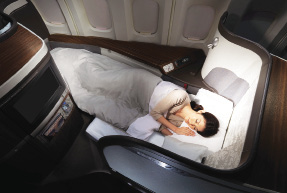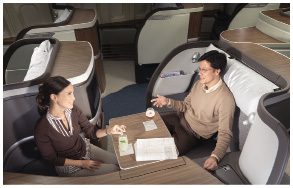- Home
- Media Kit
- Current Issue
- Past Issues
- Ad Specs-Submission
- Ad Print Settings
- Reprints (PDF)
- Photo Specifications (PDF)
- Contact Us

![]()
ONLINE

Editors' Note
Tony Tyler joined the Swire group in 1977 and has worked with the group in Hong Kong, Australia, the Philippines, Canada, Japan, Italy, and the United Kingdom. He has been a Director of the company since 1996 and was appointed Director Corporate Development in 1996 and Chief Operating Officer in 2005. He is also Chairman of Hong Kong Dragon Airlines Limited and Director of John Swire & Sons (H.K.) Limited and Swire Pacific Limited. Tyler served as Chairman of the International Air Transport Association (IATA) Board of Governors until June 2010.
Company Brief
Founded in Hong Kong in 1946, Cathay Pacific Airways (www.cathaypacific.com) is an international airline registered and based in Hong Kong, offering scheduled cargo and passenger services to more than 110 destinations around the world. Cathay Pacific and its subsidiaries and associates employ more than 26,000 staff in Hong Kong and worldwide. The airline’s two major shareholders are both Hong Kong companies listed on the Hong Kong Stock Exchange, as is Cathay Pacific itself. Cathay Pacific is the major shareholder in AHK Air Hong Kong Limited, an all-cargo carrier that offers scheduled services in the Asia region, and owns 100 percent of Hong Kong Dragon Airlines Limited. In addition, Cathay Pacific is a founding member of the oneworld global alliance whose combined network serves over 700 destinations worldwide.
Of course, because we’re an organization that is run for our customers, not for our staff. The office has to be functional, it has to be working, but we want first class to be as comfortable as anything our customers have ever experienced.
First of all, we asked our passengers what they wanted and they said they wanted privacy, control of their own environment, and high levels of comfort. But they also said they wanted the high-touch level of service as well, which to us meant, don’t put them in a box; don’t close them off, because then you can’t see what they need and can’t communicate easily with them. So we worked with designers and with the seat manufacturer to come up with the concept, which provides a good balance between privacy and connectedness. So when you’re in our first class, none of the other passengers can see you. And yet the cabin crew, when they’re moving around the cabin making sure everyone is comfortable, can see you and you can see them, and so it’s unobtrusive in that sort of surveillance of your needs. But when you’re sitting in your suite, you’re on your own.
We also decided to make the cabin look nicer and also to give people this control aspect that I mentioned. We got rid of the overhead bins where people put their bags, because they’re ugly and make the cabin feel low. So we created storage space under the ottoman in front of you to put your roller bag. Then we added a little closet where you can put your briefcase and hang your suit. So you have your stuff right with you. You don’t even have to stand up to get it – you just have to reach out.

Cathay Pacific’s roomy first class
You can’t change in the suite. You need to go to the facility to change, but on the 747, we’ve also expanded the size of the lavatory. We don’t make a big thing about it in our promotion, but people who fly with us often comment about how we’ve given people a nice spacious lavatory.
The bane of our lives is all the security issues we have to deal with. And they’re about to get worse because of the underpants bomber. That was a failure of intelligence. The authorities had been warned about this guy; he was on their radar screen already, and yet he was able to board the aircraft with underpants full of explosives. But the reaction of the authorities to this incident has not been to admit that they need to sort out their intelligence processing; it has basically been to impose more restrictions and costs on us and make life much more difficult for us and our customers, while not addressing the problem – an intelligence problem. Fix that. Don’t make our lives even more difficult than they already are.

The difficulty in running an airline as a business is that so much of what impacts your business and your financial results are outside your control. The obvious example is fuel prices. We go into great detail planning our business for the next three years but, at the end of the day, the bottom line in our budget is going to depend on how accurately we guess the future fuel prices. The exchange rates, again, are totally outside of our control and have a huge impact. The amount of regulation and government involvement in the industry can also be frustrating. Of course, there has to be regulation on safety and on the technical side, but there is much too much regulation on the commercial side.
The most exciting thing is going to be China, because China is going to drive expansion of Cathay Pacific over the next 10 to 15 years, both through travel into China and through the outbound market. We’re seeing what happened before in Japan, Korea, and Taiwan now happening in mainland China, but the difference is that China has a billion and a half people. They’re not all immediately going to be rich enough to get on a Cathay Pacific flight to Sydney, but there are an awful lot of them who will be and who are already. We’re ideally well placed to tap into that. And, of course, in-bound travel into China, whether it’s businessmen doing deals, whether it’s people accessing or providing capital to the Chinese market, more often now accessing Chinese capital, or tourists going there to see this amazing place.•